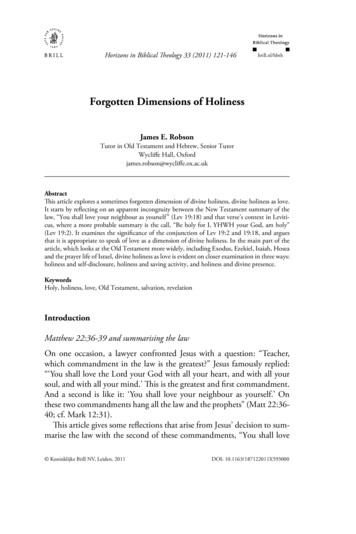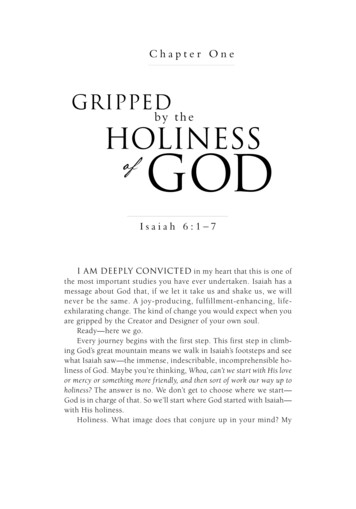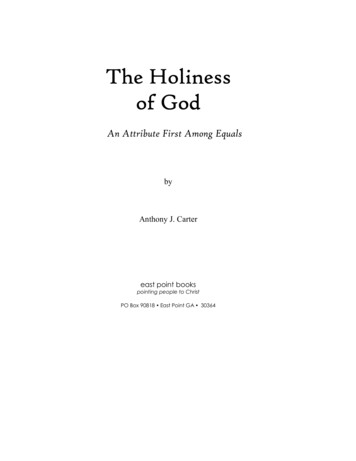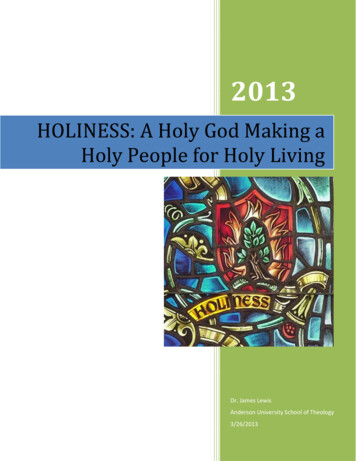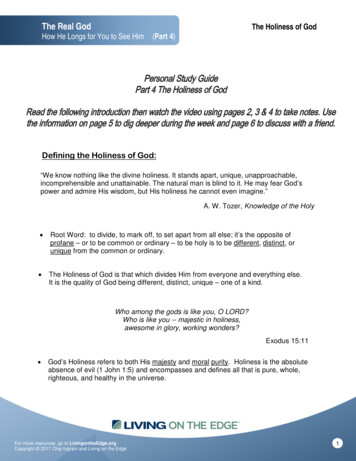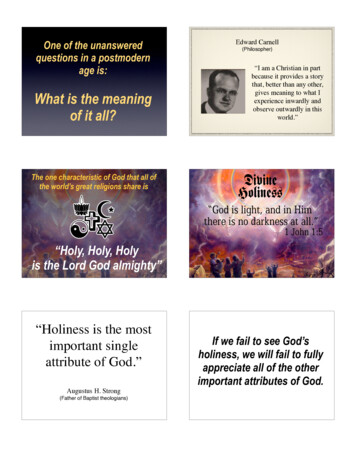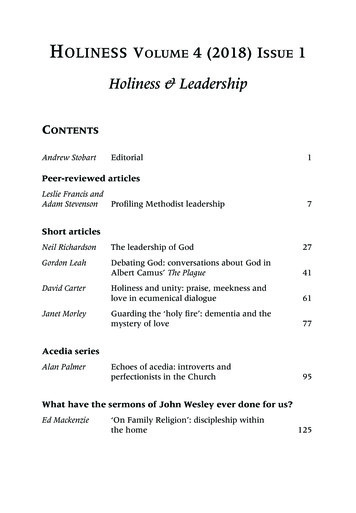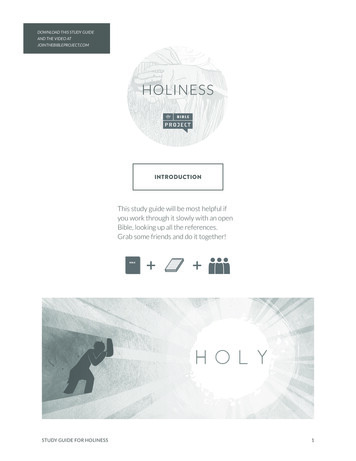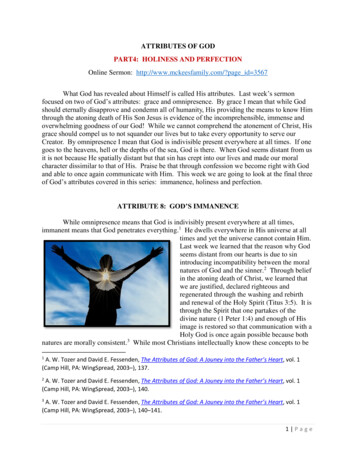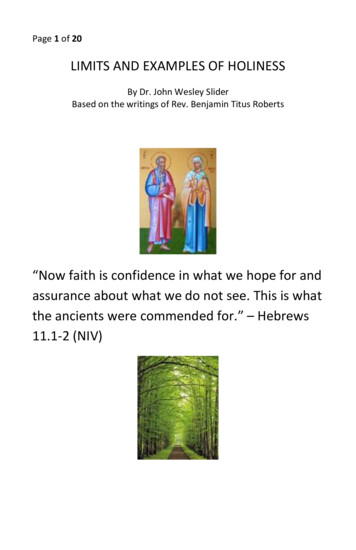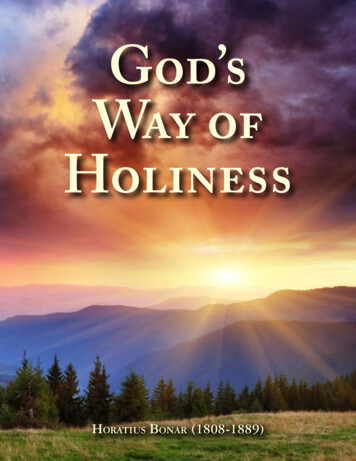
Transcription
God’sWay ofHolinessHoratius Bonar (1808-1889)
GOD’S WAYOF HOLINESSContentsPreface . 31. The New Life . 42. Christ for Us, the Spirit in Us . 113. The Root and Soil of Holiness . 174. Strength against Sin . 245. The Cross and Its Power . 286. The Saint and the Law . 347. The Saint and the Seventh Chapter of Romans . 448. The True Creed and the True Life . 499. Counsels and Warnings . 56
Copyright 1999 Chapel Library: annotations. Original text is in the public domain. Printed in the USA. AllScripture quotations are from the King James Version. Chapel Library does not necessarily agree with all thedoctrinal positions of the authors it publishes. Permission is expressly granted to reproduce this material byany means, provided1) you do not charge beyond a nominal sum for cost of duplication, and2) this copyright notice and all the text on this page are included.Chapel Library sends Christ-centered materials from prior centuries worldwide without charge, relying entirely upon God’s faithfulness. We therefore do not solicit donations, but we gratefully receive support fromthose who freely desire to give.Worldwide, please download material without charge from our website, or contact the international distributor as listed there for your country.In North America, for additional copies of this booklet or other Christ-centered materials from prior centuries, please contactCHAPEL LIBRARY2603 West Wright StreetPensacola, Florida 32505 USAPhone: (850) 438-6666 Fax: (850) 438-0227chapel@mountzion.org www.ChapelLibrary.orgPlease see also Holiness, Part 1 & 2 by J. C. Ryle (1816-1900); Perseverance in Holiness by Charles H. Spurgeon(1834-1892); and Free Grace Broadcaster 215, Sanctification—all available from Chapel Library. The FGB is aquarterly digest of six to ten messages from prior centuries, all on one theme, with a different theme each issue. Request a subscription– worldwide, eBook sent via iptions/– in North America, printed copy sent via mail: write Chapel Library– in a country with an international distributor, printed copy sent via mail; writeto them directly: /
PrefaceThe way of peace and the way of holiness lie side by side, or rather, they are one. That whichbestows the one imparts the other; and he who takes the one takes the other also. The Spirit ofpeace is the Spirit of holiness. The God of peace is the God of holiness.If at any time these paths seem to go asunder, there must be something wrong—wrong in theteaching that makes them seem to part company, or wrong in the state of the man in whose lifethey have done so.They start together, or at least so nearly together that no eye, save the divine, can mark a difference. Yet, properly speaking, the peace goes before the holiness, and is its parent. This is whatdivines call “priority in nature, though not in time,” which means substantially this, that the difference in such almost identical beginnings is too small in point of time to be perceived by us, yetit is not on that account the less distinct and real.The two are not independent. There is fellowship between them, vital fellowship, each beingthe helpmeet of the other. The fellowship is not of mere coincidence, as in the case of strangerswho happen to meet on the same path, nor of arbitrary appointment, as in the case of two parallelroads, but of mutual help and sympathy—like the fellowship of head and heart, or of two membersof one body, the peace being indispensable to the production or causation of the holiness, and theholiness indispensable to the maintaining and deepening of the peace.He who affirms that he has peace, while living in sin, is “a liar, and the truth is not in him”(1Jo 2:4). He who thinks that he has holiness, though he has no peace, ought to question whetherhe understands aright what the Bible means by either the one or the other; for, as the essence ofholiness is the soul’s right state toward God, it does not seem possible that a man can be holy solong as there is no conscious reconciliation between God and him. A spurious holiness there maybe, founded upon a spurious peace, or upon no peace at all; but true holiness must start from atrue and authentic peace.Horatius Bonar, Kelso, Scotland, July 1864
1. The New LifeIt is to a new life that God is calling us; not to some new steps in life, some new habits orways or motives or prospects, but to a new life.For the production of this new life the eternal Son of God took flesh, died, was buried, androse again. It was not life producing life, a lower life rising into a higher, but life rooting itselfin its opposite, life wrought out of death, by the death of “the Prince of life” (Act 3:15). Of thenew creation, as of the old, He is the author.For the working out of this, the Holy Spirit came down in power, entering men’s souls anddwelling there, that out of the old He might bring forth the new.That which God calls new must be so indeed. For the Bible means what it says, as being, ofall books, not only the most true in thought, but the most accurate in speech. Great then andauthentic must be that “new thing in the earth” (Jer 31:22) which God “creates,” to which Hecalls us, and which He brings about by such stupendous means and at such a cost. Most hateful also must that old life of ours be to Him, when, in order to abolish it, He delivers up HisSon; and most dear must we be in His sight when, in order to rescue us from the old life, andmake us partakers of the new, He brings forth all the divine resources of love and power andwisdom, to meet the exigencies of a case which would otherwise have been wholly desperate.The man from whom the old life has gone out, and into whom the new life has come, isstill the same individual. The same being that was once “under the law” is now “under grace”(Rom 6:14). His features and limbs are still the same; his intellect, imagination, capacities, andresponsibilities are still the same. But yet old things have passed away; all things have becomenew. The old man is slain; the new man lives. It is not merely the old life retouched and mademore comely, defects struck out, roughnesses smoothed down, graces stuck on here and there.It is not a broken column repaired, a soiled picture cleaned, a defaced inscription filled up, anunswept temple whitewashed. It is more than all this, else God would not call it a new creation, nor would the Lord have affirmed with such awful explicitness, as He does in His conference with Nicodemus, the divine Law of exclusion from and entrance into the kingdom of God(Joh 3:3). Yet how few in our day believe that “that which is born of the flesh is flesh; and thatwhich is born of the Spirit is spirit” (Joh 3:6).Hear how God speaks! He calls us “newborn babes” (1Pe 2:2), “new creatures” (Gal 6:15), a“new lump” (1Co 5:7), a “new man” (Eph 2:15), doers of a “a new commandment” (1Jo 2:8),heirs of “a new name” and a new city (Rev 2:17; 3:12), expectants of “new heavens and a newearth” (2Pe 3:13). This new being, having begun in a new birth, unfolds itself in “newness ofspirit” (Rom 7:6), according to a “new covenant” (Heb 8:8), walks along a “new and living way”(Heb 10:20), and ends in the “new song” and the “new Jerusalem” (Rev 5:9; 21:2).It is no outer thing, made up of showy moralities and benevolences, or picturesque ritesand graceful routine of devotion, or sentimentalisms bright or somber, or religious utteranceson fit occasions, as to the grandeur of antiquity, or sacramental grace, or the greatness of crea-
1. The New Life5turehood, or the nobleness of humanity, or the universal fatherhood of God. It is somethingdeeper, and truer, and more genial, than that which is called deep, and true, and genial inmodern religious philosophy. Its affinities are with the things above; its sympathies are divine;it sides with God in everything. It has nothing, beyond a few expressions, in common with thesuperficialities and falsehoods which, under the name of religion, are current among multitudes who call Christ “Lord” and “Master.”A Christian is one who has been “crucified with Christ,” who has died with Him, been buried with Him, risen with Him, ascended with Him, and is seated “in heavenly places” with Him(Rom 6:3-8; Gal 2:20; Eph 2:5-6; Col 3:1-3). As such he reckons himself dead unto sin, butalive unto God (Rom 6:11). As such he does not yield his members as instruments of unrighteousness unto sin, but he yields himself unto God, as alive from the dead, and his members asinstruments of righteousness unto God. As such he seeks “the things which are above,” andsets his affection on things above, mortifying his “members which are upon the earth; fornication, uncleanness, inordinate affection, evil concupiscence and covetousness, which is idolatry” (Col 3:1-5).This newness is comprehensive, both in its exclusion of the evil and its inclusion of thegood. It is summed up by the apostle in two things: righteousness and holiness. “Put off,” sayshe, “the old man, which is corrupt, according to the deceitful lusts; and be renewed in thespirit of your mind;.put on the new man, which after God is created in righteousness andtrue holiness” (Eph 4:22-24), literally “righteousness and holiness of the truth,” that is, restingon the truth. The new man then is meant to be righteous and holy, inwardly and outwardly,before God and man, as respects Law and Gospel, and this through the truth. For as thatwhich is false (“the lie” vs. 25) can only produce unrighteousness and unholiness, so the truthproduces righteousness and holiness through the power of the Holy Ghost. Error injures,truth heals; error is the root of sin, truth is that of purity and perfection.It is then to a new standing or state, a new moral character, a new life, a new joy, a newwork, a new hope, that we are called. He who thinks that religion comprises anything less thanthis knows nothing yet as he ought to know. To that which man calls “piety,” less may suffice;but to no religion which does not in some degree embrace these, can the divine recognition beaccorded.1These are weighty words of the apostle, “We are his workmanship.” Of Him, and throughHim, and to Him are all things pertaining to us. Chosen, called, quickened, washed, sanctified,and justified by God Himself, we are in no sense our own deliverers. The quarry out of whichthe marble comes is His; the marble itself is His, the digging and hewing and polishing areHis; He is the sculptor and we the statue.“We are his workmanship,” says the apostle. But this is not all. We are, he adds, “created inChrist Jesus unto good works, which God hath before ordained that we should walk in them”(Eph 2:10). The plan, the selection of the materials, the model, the workman, the workmanship, are all divine; and though it doth not yet appear what we shall be, we know that we shallbe “like him,” His image reproduced in us, Himself represented by us, for we are “renewed inknowledge after the image of him that created us” (Col 3:10).1Ephesians 2:10 “His poem,” the production of His wisdom, love, and power; that which He and only He canmake, Psalm 100:3. A house should be worthy of the builder, and a poem of him from whom it comes.
6G OD ’ S W AY OF H OLI NE SSIt is not, however, dead, cold marble that is to be wrought upon. That is simple work, requiring just a given amount of skill. But the remolding of the soul is unspeakably more difficult, and requires far more complex appliances. The influences at work in opposing—internaland external, spiritual, legal, physical—are many; and equally numerous must be the influences brought into play to meet all these, and carry out the design. The work is not mechanical, but moral and spiritual (physical in a sense, as dealing with the nature of things, but moretruly, moral and spiritual). Omnipotence is not mere unlimited physical power, operating, asupon inanimate matter, by mere intensity of volition; but power which, with unlimited resources at its command, exhibits its greatness by regulating its forthgoings according to moralcircumstances, producing its greatest results by indirect moral influences, developing itself inconformity with Law and sovereignty, and holy love on the one hand, and on the other withhuman guilt, and creature responsibility, and free volition. The complexities thus introducedare infinite, and the “variable quantities,” if one may so speak, are so peculiar and so innumerable, that we can find no formula to help us in the solution of the problem; we get bewilderedin speculating on the processes by which omnipotence deals with moral beings, either in theirsinfulness or their holiness.Here let us also notice the duality or twofoldness of divine truth, the overlooking of whichhas occasioned much fruitless controversy and originated many falsehoods. Truth is, indeed,not two-sided, but many-sided, like a well-cut crystal. In a more general sense, however, it istruly double; with a heavenly and an earthly, a divine and a human side or aspect. It is at theline where these two meet that the greatest nicety of adjustment is required, and hence it ishere that divergent theologies have come specially into conflict. The heavenward and theearthward aspects of truth must be carefully distinguished—the one fitting into the other, theone the counterpart of the other. God is absolute Sovereign; this is the one side. Man has volition of his own, and is not a machine or a stone; that is the other. God chooses and draws according to the good pleasure of His will; yet He hinders no man from coming or from willing.God is the giver of faith, yet “faith cometh by hearing, and hearing by the word of God” (Rom10:17). Hence the difficulty of believing is not from the absence of proper faculties, but fromthe derangement of these, and conversion is God’s restoration of these to their original nature.Faith is not a foreign gem imported into the soul, distinct from all our original powers; it issimply the man believing, in consequence of his soul being set right by the Holy Spirit, but hebelieves and disbelieves in the same way as before. It is not the intellect, or the mind, or theaffections, that believe; it is the man, the whole man, the same whole man that formerly disbelieved. Very absurd and unphilosophical (not to say unscriptural) have been the questionsraised as to the seat of faith, whether it is in the intellect, or the will, or the heart. Faith is theman believing, just as love is the man loving. In Romans 10:9, the apostle is not contrastingthe heart with the mind, but with the mouth; in other words, the inner with the outer man.God worketh in us both to will and to do, yet He commands us to work out our salvationwith fear and trembling. It is God that sanctifies us, yet it is through “the truth” that we aresanctified (Joh 17:17). It is God that purifies (Ti 2:14), yet it is by faith that our hearts are purified (Act 15:9). It is God that fills us with joy and peace, and yet this is “in believing.” This duality is the key to the solution of many a hard controversy. The movements of man’s intellectare not superseded by God but assumed and regulated; the intellect itself is not overborne and
1. The New Life7forced, but set free to work its true work truly. 2 The “heavenly things” and “earthly things” aredistinct, yet not separate; always to be viewed in connection with each other, yet not confused;for confusion here is mysticism, superstition, and false doctrine. “There are celestial bodies,and bodies terrestrial; but the glory of the celestial is one, and the glory of the terrestrial is another” (1Co 15:40). In every Bible truth there are two elements, the divine and the human; butthe divine element is one thing, the human another. The theology that embodies most truth isthat which knows how to recognize both of these, without confusion, yet without isolation orantagonism, and which refuses to merge either the divine in the human or the human in thedivine. 3Hence the necessity for confining ourselves to the Word, and the danger of introducinghuman metaphysics into questions connected with the spiritual change wrought on us. It isGod that worketh; it is we who are wrought upon; and everything needful to be known in connection with this work is revealed in the divine record. We give this thought some prominencebecause of the tendency with many to magnify humanity, and to undervalue the greatness ofthat change which begins the Christian course and character. No elevation of natural taste, noinfusion of religious or benevolent earnestness, no cultivation of the intellect, can fill up thedescription given us in the word of one “who fears God,” and is “called according to his purpose” (Rom 8:28), “begotten again unto a lively hope by the resurrection of Jesus Christ fromthe dead” (1Pe 1:3). And we urge this the more decidedly because, as is the beginning, so willbe the middle and the end. A false idea or a diverging step at the outset may lead to a false religion throughout life, to an imperfect and superficial goodness, as one incorrect figure or signin an equation falsifies both process and result. If the dislocated joint is not properly set, it willnever work comfortably; and if the wound is merely skinned over, the disease may be taking itsown way underneath, all the more fatally because it is supposed to have been removed.How the Holy Spirit operates in producing the newness of which we have spoken, we knownot; yet we know that He does not destroy or reverse man’s faculties; He renovates them all, sothat they fulfill the true ends for which they were given. As He does not make the hand thefoot, nor the eye the ear, so He does not make the heart the intellect, nor the will the judgment. Each faculty remains the same in end and use as before, only purified and set properlyto work. Nor does the Holy Spirit supersede the use of our faculties by His indwelling. Ratherdoes this indwelling make these more serviceable, more energetic, each one doing his properwork and fulfilling his proper office; while the whole man, body, soul and spirit, instead of being brought under mechanical constraint, is made more truly free, never more fully himself2The more thoroughly we can study the Word of God, the better; and all critical helps are to be welcomed.Genuine scholarship, consecrated to the elucidation of the Word, is an accomplishment of no commonprice. Everything that brings our souls into full contact with “the Word,” in its fullness and variety, so asto steep them in it, is to be greatly prized, as fitted to make us holier, more fruitful, and more spiritualmen.3We hear much of the divine and the human element in Scripture; nor is the expression amiss; yet might wenot rather say that the Bible is all human and yet all divine. It is perfect according to what God meant it tobe, though we may note what we call “imperfections” in it. The mountains of earth, in their ruggedness,are perfect in their way, though they have not the artificial perfection of the statue or the temple. God haschosen that His book and His world should resemble each other in that kind of perfection—a perfectionwhich man appreciates in the landscape, but depreciates in the Bible.
8G OD ’ S W AY OF H OLI NE SSthan when filled with the Holy Spirit. For the result of the indwelling Spirit is liberty; notbondage, or the production of an artificial character.Thus, although no violence is done to our being in regeneration, omnipotence is at work atevery point. Our new being is not the result of a mechanical process, yet it is the product ofdivine power. God claims it as a “creation,” and as His own handiwork. “He that hath wroughtus for the selfsame thing is God” (2Co 5:5), where the word implies the thorough elaborationof some difficult piece of work. “It is God which worketh in us both to will and to do of hisgood pleasure” (Phi 2:13), where the expressions indicate an operation which influences our“willing” as well as our “doing,” and this on account of His being “well pleased” with Christ(Mat 3:17), and with His own eternal design. “God’s tillage” (or husbandry, 1Co 3:9) is Hisname for us when speaking as a husbandman, “God’s building” (or fabric), His name whenspeaking as an architect. It is to the image of His Son that He has predestinated us to be conformed, that He might be the firstborn among many brethren (Rom 8:29), having “chosen usin him before the foundation of the world, that we should be holy and without blame beforehim in love” (Eph 1:4).It is, then, to holiness that God is calling us (1Th 4:7); that we should have our “fruit untoholiness” (Rom 6:22), that our hearts should be stablished “unblameable in holiness” (1Th3:13); that we should abound in “all holy conversation and godliness” (2Pe 3:11); that weshould be “a holy priesthood” (1Pe 2:5); “holy in all manner of conversation” (1Pe 1:15);“called with a holy calling” (2Ti 1:9); “holy and without blame before him in love” (Eph 1:4),presenting not only our souls but our bodies as (not only a living but) a holy sacrifice to God(Rom 12:1); nay, remembering that these bodies are not only “a sacrifice,” but a “temple of theHoly Ghost” (1Co 6:19).Holiness is likeness to God, to Him Who is the Holy One of Israel, to Him Whom they laudin heaven, as “Holy, holy, holy” (Rev 4:8). It is likeness to Christ, to “that Holy thing” whichwas born of the virgin, to Him Who was “holy, harmless, undefiled, separate from sinners”(Heb 7:26). It is not only disjunction from evil, and from an evil world; but it is separation unto God and His service. It is priestly separation, for priestly service. It is distinctiveness such asthat which marked the tabernacle and all its vessels, separation from every common use: separation by blood, “the blood of the everlasting covenant” (Heb 13:20); this blood (or that whichit signifies, namely, death) being interposed between us and all common things, so that we aredead to sin, but alive unto God, alive to righteousness, having died and risen in Him Whoseblood has made us what we are: saints, holy ones.This holiness or consecration extends to every part of our persons, fills up our being,spreads over our life, influences everything we are, or do, or think, or speak, or plan, small orgreat, outward or inward, negative or positive, our loving, our hating, our sorrowing, our rejoicing, our recreations, our business, our friendships, our relationships, our silence, ourspeech, our reading, our writing, our going out and our coming in—our whole man in everymovement of spirit, soul, and body. In the house, the sanctuary, the chamber, the market, theshop, the desk, the highway, it must be seen that ours is a consecrated life.In one aspect, sanctification is an act, a thing done at once, like justification. The momentthe blood touches us—that is, as soon as we believe God’s testimony to the blood—we are“clean” (Joh 15:3), “sanctified,” set apart for God. It is in this ceremonial or priestly sense thatthe word is used in the Epistle to the Hebrews; for as that to the Romans takes us into the fo-
1. The New Life9rum and deals with our legal standing, so that to the Hebrews takes us into the temple, anddeals with our priestly standing. As the vessels of the sanctuary were at once separated to Godand His service the moment the blood touched them, so are we. This did not imply that thosevessels required no daily ablution afterwards, so neither does our consecration intimate thatwe need no daily sanctifying, no inward process for getting rid of sin. The initiatory consecration through the blood is one thing, and the continual sanctifying by the power of the HolyGhost is another. The former is the first step, the introduction to the latter; nay, absolutelyindispensable to any progress in the latter; yet it does not supersede it, but makes it rather agreater necessity. To this very end we are consecrated by the blood, that we may be purifiedinwardly by the Holy Ghost; and he who would make the completeness of the former act a substitute for the latter process, or a reason for neglecting it, has yet to learn what consecrationmeans, what is the import of the blood which consecrates, and for what end we were chosen inChrist and called by His grace (Eph 1:4).The thing which man calls sin may be easily obliterated or toned down into goodness. Itdeserved no expulsion from Paradise, no deluge, no Sodom-fire; it is a thing which the flamesof Sinai greatly exaggerate, and of which Israel’s history presents an exceptional picture. It isone of the mishaps of humanity, the enormity of which has been quite misreckoned by theologians, and the history of which, in Scripture, must be read with abatements and due allowances for oriental colouring! It is not a thing for the judge, but for the physician; not a thing forcondemnation, but for pity. It deserves no hell, no divine wrath, no legal sentence; it needs noatonement, no blood, no Cross, no substitution of life for life. Mere incarnation as the expression of divine love to the unfortunate, and the intimation to the universe of God’s allcomprehending fatherhood, and of Adamhood’s union with God will be sufficient.But that which God calls sin is something infinitely terrible, far beyond our ideas of misfortune and disease, something to which even Sodom and Sinai gave but faint expression. It issomething which the Law curses and the Judge condemns; something which needs a righteous pardon, a divine Saviour, and an almighty Spirit; something which can destroy a soul andruin a world, which can, from one single drop, overflow earth for six thousand years, and fillhell eternally. It is that of whose hatefulness the blood and smoke and fire of the altar speak,which is “exceeding sinful” (Rom 7:13), whose wages is death, the first and second death, andof whose balefulness the everlasting darkness is the witness.He who would know holiness must understand sin; and he who would see sin as God seesit, and think of it as God does, must look at the Cross and grave of the Son of God, and mustknow the meaning of Gethsemane and Golgotha.Am I bound to think of sin as God thinks? Most certainly. Have I no liberty of thinkingotherwise? None. You may do so, if you choose to venture, but the consequences are fearful,for error is sin. We are not bound to think as man thinks. In this respect we have entire liberty; not tradition, but free thought may be our formula here. But we are bound to think as Godthinks, not in one thing but in everything. Woe be to him that presumes to differ from God, orreckons it a light matter to be of one mind with Him, or tries to prove that the Bible is inaccurate or unintelligible, or but half-inspired, in order to release himself from the responsibilityof receiving the whole truth of God and afford him license to believe or disbelieve at pleasure,freed from the trammels of a fixed revelation.
10G OD ’ S W AY OF H OLI NE SSThe tendency of the present day is to underestimate sin and to misunderstand its nature.From the Cross of Christ men strike out the very elements which intimate the divine opinionof its evil. Sin is admitted to be an evil, greater or less according to circumstances; a hereditarypoison, which time and earnestness will work out of the constitution; an unruly but inevitableappetite, which is to be corrected gradually by moral discipline and wholesome intellectualdiet, rendered medicinal by a moderate infusion of the “religious element”; a sickening pain,sometimes in the conscience, sometimes in the heart, that is to be soothed by the dreamy mysticism, which, acting like spiritual chloroform, dulls the uneasiness without touching its seat;this is all!Why a loving God should, for so slight and curable an evil, have given over our world forsix thousand years to such sorrow, pain, tears, weariness, disease and death, as have overflowedit with so terrible a deluge, is a question which such a theory of evil leaves unanswered. Yetsuch are the representations of sin with which we find a large amount of the literature and thereligion of our day penetrated. Humanity is struggling upward, nobly self-reliant! The race iselevating itself (for the Darwinian theory has found its way into religion); and Christianity is auseful help in this process of self-regeneration! Thus does many a prophet speak peace wherethere is none, bent on “healing the hurt” (see Jer 8:11) by the denial of its deadliness. Of whatavail this calling evil good and good evil, this putting darkness for light and light for darkness,this putting bitter for sweet and sweet for bitter, will be in the great day of reckoning, a coming hour will show.“Awake to righteousness, and sin not” (1Co 15:34) is God’s message to us. “Be ye holy; for Iam holy” (1Pe 1:16). “Present your bodies a living sacrifice, holy, acceptable unto God” (Rom12:1). “Purge out.the old leaven, that ye may be a new lump” (1Co 5:7). “Let everyone thatnameth the name of Christ depart from iniquity” (2Ti 2:19). “Denying ungodliness and worldlylusts.live soberly, righteously, and godly, in this
holiness is the soul’s right state toward God, it does not seem possible that a man can be holy so long as there is no conscious reconciliation between God and him. A spurious holiness there may be, founded upon a spurious peace, or upon no peace at all; but true holi
